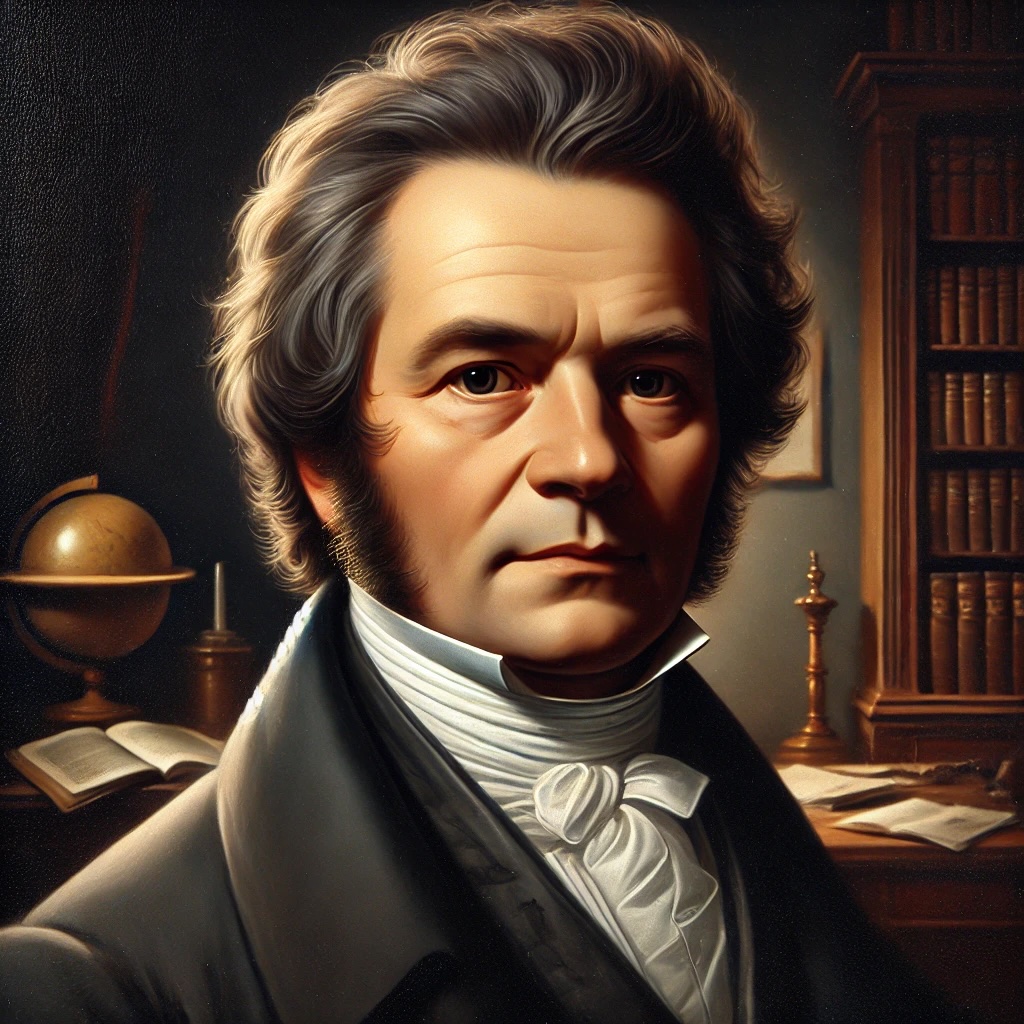George Wilhelm Friedrich Hegel
(1770-1831)

One of the great German philosophers, Hegel is principally known for his famous dialectic: thesis generates antithesis, to be superseded by a synthesis of the rational within them and a repudiation of the irrational. Hegel advanced in his academic career, producing works such as the Encyclopedia of the Philosophical Sciences and the Philosophy of Right. He occupied successive chairs in philosophy in Heidelberg and Berlin, where he died of epidemic cholera. .
Georg Wilhelm Friedrich Hegel (1770–1831) was a German philosopher, widely regarded as one of the most influential figures in Western philosophy. He developed a comprehensive philosophical system that sought to integrate various aspects of reality—such as nature, history, politics, and religion—into a unified framework. His work is a cornerstone of what is now known as German Idealism, a movement that sought to resolve contradictions in earlier Enlightenment thought.
Early Life and Education
Hegel was born on August 27, 1770, in Stuttgart, in the Duchy of Württemberg, part of modern-day Germany. He was the son of a civil servant and was raised in a Protestant household. Hegel showed an early interest in the humanities and, after attending a Latin school, he entered the Tübinger Stift, a Protestant seminary in Tübingen. There, he studied philosophy and theology alongside other prominent figures like Friedrich Hölderlin and Friedrich Schelling. Though initially trained in theology, Hegel's interest in philosophy grew, leading him to pursue academic and intellectual work in the field.
Philosophical Development and Key Works
Hegel's philosophical career truly took off in the early 19th century. His first major work, *Phenomenology of Spirit* (1807), is a dense, complex text that outlines the development of human consciousness. In this work, Hegel traces the evolution of self-awareness through a dialectical process—a method of understanding the progress of ideas through contradiction and resolution. The *Phenomenology* introduces key Hegelian concepts, such as the "master-slave dialectic" and the notion of "Absolute Knowledge," which represents the culmination of human understanding.
Hegel's dialectical method is one of his most notable contributions to philosophy. He believed that historical development occurs through a process of thesis, antithesis, and synthesis—where an initial idea (thesis) generates its opposite (antithesis), and their conflict is resolved in a higher unity (synthesis). This dialectical movement is central to his thought and is applied across his works on politics, history, and art.
In 1812, Hegel published the first volume of his *Science of Logic*, which lays out the principles of his system. The *Logic* deals with categories of thought, such as being, nothing, and becoming, and forms the foundation of his philosophical system. His *Encyclopedia of the Philosophical Sciences* (1817) and *Philosophy of Right* (1820) further expanded on his system, covering topics ranging from metaphysics to ethics and law.
Historical Influence and Contributions
One of Hegel's most significant contributions to philosophy is his theory of history. He viewed history as the unfolding of human freedom and reason through the dialectical process. For Hegel, history was not a random series of events but a rational process leading toward the realization of freedom. He famously declared that "the real is rational, and the rational is real," suggesting that the apparent chaos of the world is, in fact, governed by rational principles.
Hegel’s political philosophy also had a lasting impact, particularly his ideas on the state and civil society. In *Philosophy of Right*, he argued that the state represents the highest realization of freedom and that individuals find their true freedom through participation in the state. His thoughts on political organization influenced both liberal and conservative thinkers and played a key role in shaping 19th-century political theory.
Legacy
Hegel's work has influenced a broad spectrum of later thinkers, including Karl Marx, who developed his theory of historical materialism by adapting Hegel's dialectical method to focus on material conditions and class struggle. Hegel’s influence extends to existentialism, phenomenology, and various strands of 20th-century thought, making him a foundational figure in modern philosophy.
Despite the complexity and sometimes abstract nature of his writings, Hegel’s philosophy remains crucial to understanding the development of modern thought. His ideas on history, politics, and metaphysics continue to resonate, making him one of the towering figures of Western philosophy.
 >
>